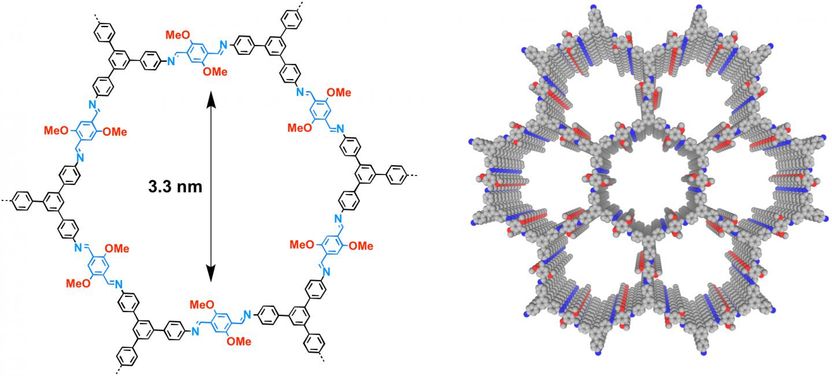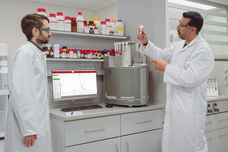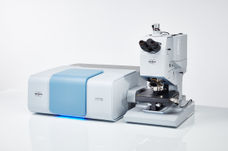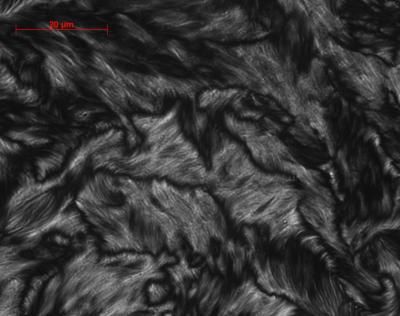Exploration of stable, crystalline, porous covalent organic frameworks
covalent organic frameworks (COFs) are a class of porous polymers that enable the atomically precise incorporation of organic units into periodic structures, creating highly ordered π-columnar arrays and one-dimensional open channels. One significant structural feature is that they can be predesigned at both primary and high-order structure levels. COFs have emerged as a platform for materials design and functional explorations. However, their low stability has been impeded any practical implementations.

The newly explored hexagonal two-dimensional layered COF.
NINS
Hong Xu, a Ph. D graduate of SOKENDAI (The Graduate University for Advanced Studies) at the Institute for Molecular Science, National Institutes of National Sciences, and his colleagues challenged for the design and synthesis of stable, crystalline, porous, covalent organic frameworks. They focused on the imine-linked COFs that formed hexagonal two-dimensional layered architectures. By incorporating electron-donating groups to the phenyl rings of imine linkages, they found that the polarization of imine bonds were softened; this electronic effect reduces the repulsion between layers and strengthens the interlayer interactions to reinforce the stability of the resulting COFs.
The newly explored COFs are stable in various organic solvents, water (25 and 100 °C), strong acid (aqueous HCl solution, 12 M) and strong base (aqueous NaOH solution, 14 M). Upon dispersion in these solvents for seven days, the crystallinity and porosity of the COFs were retained. Such a robust COF has not been developed and the stable COFs provide a platform for functional exploration.
In this work, they further developed chiral organocatalytic functions based on these stable COFs. By incorporating chiral catalytic sites into the pore walls of the COFs, the group developed a series of chiral COFs in which the content organocatalytic sites on the walls can be precisely tuned. By virtue of insolubility of COF skeletons, the chiral COFs serve as heterogeneous catalysts for the asymmetric Michael reactions.
These catalysts exhibited greatly enhanced catalytic activity and high enantioselectivity, and most importantly, they catalyzed the reactions in water under ambient conditions. These COF catalysts are easily separated from the reaction systems through simple filtration and can be cycle used for many times. The development of heterogeneous organocatalysts would greatly reduce the cost of chemical transformations and open a way to practical application.
Hong Xu said "Stability of COFs is a central issue before any applications. The finding of the electron-donating effects on the stabilization of COFs is a serendipity. This work demonstrates very well the interesting point of COFs in a way how chemistry plays a key role in materials science.".
Associate Prof. Donglin Jiang, the team leader of this research group commented "One of the most challenging issues in the field of COFs is the combination of stability, crystallinity and porosity. This study would accelerate the functional explorations and applications of COFs".
Original publication
Hong Xu, Jia Gao and Donglin Jiang; "Stable, crystalline, porous, covalent organic frameworks as a platform for chiral organocatalysts"; Nature Chemistry
Original publication
Hong Xu, Jia Gao and Donglin Jiang; "Stable, crystalline, porous, covalent organic frameworks as a platform for chiral organocatalysts"; Nature Chemistry
Organizations
Other news from the department science
These products might interest you

Eclipse by Wyatt Technology
FFF-MALS system for separation and characterization of macromolecules and nanoparticles
The latest and most innovative FFF system designed for highest usability, robustness and data quality

Spinsolve Benchtop NMR by Magritek
Spinsolve Benchtop NMR
Spinsolve is a revolutionary multinuclear NMR spectrometer that provides the best performance

HYPERION II by Bruker
FT-IR and IR laser imaging (QCL) microscope for research and development
Analyze macroscopic samples with microscopic resolution (5 µm) in seconds

Get the chemical industry in your inbox
By submitting this form you agree that LUMITOS AG will send you the newsletter(s) selected above by email. Your data will not be passed on to third parties. Your data will be stored and processed in accordance with our data protection regulations. LUMITOS may contact you by email for the purpose of advertising or market and opinion surveys. You can revoke your consent at any time without giving reasons to LUMITOS AG, Ernst-Augustin-Str. 2, 12489 Berlin, Germany or by e-mail at revoke@lumitos.com with effect for the future. In addition, each email contains a link to unsubscribe from the corresponding newsletter.























































